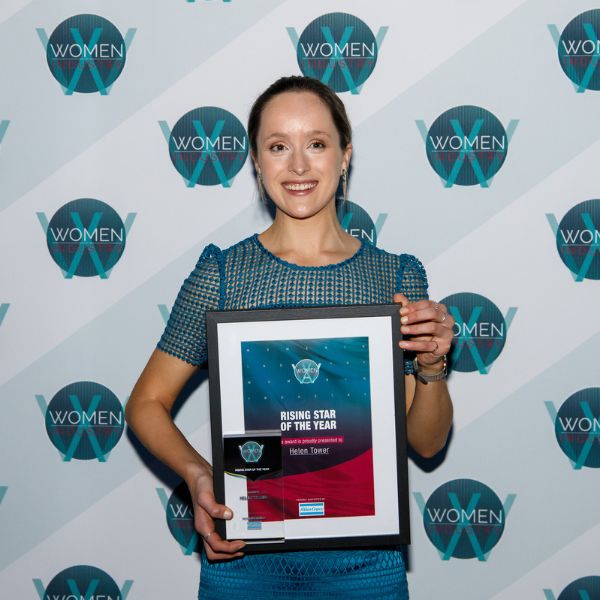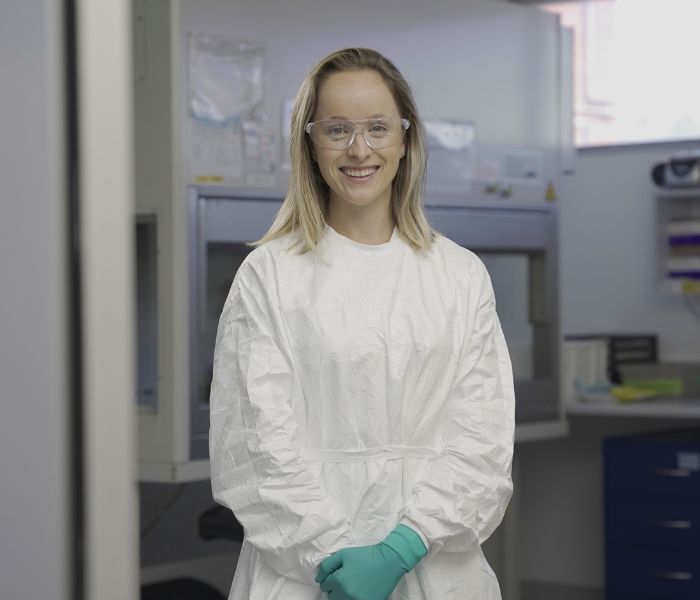
Alum Helen Tower, a Senior Validation Specialist at CSL Seqirus who was named Rising Star of the Year at the 2022 Women in Industry awards, shares her advice for early career women.
Helen Tower graduated with a Bachelor of Science (Honours) in 2018 and has forged a successful career in the male-dominated STEM sector. Helen currently works as a Senior Validation Specialist at public health biotechnology company CSL Seqirus, which manufactured the AstraZeneca COVID-19 vaccine in Australia.
Helen’s professional success was recognised with a prestigious Rising Star of the Year award at the 2022 Women in Industry awards. The judges noted that Helen was pivotal in creating frameworks that enabled CSL Seqirus to nimbly adapt their manufacturing process to produce the COVID-19 vaccine. They also noted her passion for science being reflected in her extensive mentoring pursuits.
As a rising star in STEM, we asked Helen to share her advice with other early-career women wanting to thrive in their own careers.
Adopt a continuous learning mindset
My number one piece of advice is to embrace a mindset of continuous learning at all career stages. There’s so much knowledge and experience to be gained once we realise that the learning journey never really stops, regardless of what career pathway you’re pursuing, so it’s important to embrace that learning mindset, to stay open-minded, and to be curious. Asking lots of questions is a great way to really understand the industry that you’re working in. In my experience, the best learning tends to happen when you step outside your comfort zone and when you say ‘yes’ to new challenges.
An example of this from my own career was when I was invited to work on the project management team for the AstraZeneca COVID-19 vaccine that was manufactured here at CSL Seqirus in Melbourne. That was a steep learning curve for me, but the outcomes were incredibly rewarding. I’ve taken so many valuable lessons learned from that experience and applied them to the new role that I’m working in today.
Follow your passions
My second piece of advice is to follow your passions. I love working as a scientist, and I love the inspiring work environment at my company CSL Seqirus. Ultimately, it’s so rewarding knowing that my work has a genuine positive impact on public health and the wider community. My passion for science means that I come to work every day feeling energised and inspired to bring my best self to the office and the lab. Find a career that you love, and if you don’t know what that is yet, keep trying new things until you do. The best approach is to dive in and work it out for yourself as you go.
Break down impostor syndrome
I think we all face challenges in the workplace, irrespective of gender. But one thing I’ve noticed – and I’m generalising here – is that impostor syndrome seems to be a common experience for many women. That feeling of career self-doubt is something I’ve experienced many times, and sometimes it leads to questioning your achievements. A certain mindset creeps in, asking, ‘Am I even qualified to be here?’ It doesn’t discriminate between career highs and lows.
One thing I’ve found that helps tackle impostor syndrome is acknowledging and naming the emotions that you are experiencing. If you are feeling like an impostor, I ask where is that coming from? Is it because you feel insecure? Because you’re fearful of failing? I find it really helps to identify where the emotions are stemming from on a deeper level.
To counter some of those feelings, I’m a big believer in celebrating successes. Often, we keep working hard from one thing to the next and recognising achievements can get a bit lost. However, shining a light on your achievements and the achievements of others is an important step when it comes to building confidence.
Look after your mental health
In any workplace, there will be times that are more difficult than others. When I’m in a stressful period, I find it helpful to approach what I call a ‘trust circle’ of colleagues and friends; people who I can go to for advice without judgment. I also like to stay organised by mapping out my projects two or three steps ahead to avoid excess stress when approaching deadlines. In addition, my passions outside of work, such as fitness and travel, help keep my mental health feeling fresh and energised when I am at work.

Consider mentoring – as a mentee and a mentor
Mentoring really matters. No matter what stage of your career you’re in, mentoring can have a hugely positive impact on your skills and your professional relationships. If you embrace that mindset of continuous learning, then you will probably get significant value out of it.
I’m in a unique position where I am a mentor and mentee at the same time. Here at CSL Seqirus, our site Director of Manufacturing Sciences and Technology has been my mentor for several years now. We have a wonderful relationship and she’s been so supportive of my career in countless ways. She has really helped me develop a sense of confidence at work that initially I never knew I had.
I’m also a mentor myself in two university-based mentoring programs: the University of Melbourne’s STEM Industry Mentoring Program and the In2Science Mentor Leaders program. As an industry professional, it’s so gratifying to share my passion for science with the next generation of STEM students and to pay it forward to the scientific community, whilst also developing communication and leadership skills. I learn so much from the students who I work with, demonstrating that mentoring is always a two-way relationship.
Develop transferable skills
Transferable skills are so important in any career pathway. Some key skills that I have developed include project management, communication and working with a strategic mindset – not just thinking about my projects in the here and now, but also thinking ahead and at a higher level. Adaptability in the face of change is also important, and is something we’ve all gotten better at during the COVID-19 pandemic.
To develop these transferable skills, I’d encourage volunteering for stretch assignments, working on a variety of different projects, and participating in mentoring or development programs that many organisations offer. It all links back to what I said initially, about embracing that mindset of continuous learning.
Shine a light on the success of other women
Women have come a long way in the workplace. Today, there are many more women in many different industries and careers than ever before. We’re heading in the right direction, but there’s still a gap especially when it comes to male-dominated industries and women in leadership roles. At CSL Seqirus, I have been inspired by some fantastic female leaders across the company who are continuing to pave the way for future women in leadership. As such, I believe that shining a light to encourage women to thrive in their careers is an incredibly important step towards achieving equality for women in the workplace.
Find out more about the STEM mentoring program here and all UoM mentoring programs here.